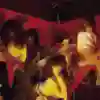We all know about how their debut album went Triple Platinum in 1996, and OAG became THE band of that decade. Here are some of the reasons and stories behind their phenomenal rise to superstardom that you might not have known:
60’s Crunchy Pop Fuzz
OAG introduced their own musical genre, “60’s crunchy pop fuzz”, with a sound like no other band out there. It actually came about from the guitar effects pedals that they used. But combined with Radhi’s stellar songwriting skills, it became OAG’s own unique sonic blueprint that was instantly recognizable as their own.
Demos, Demos, Demos!
Before they were offered a recording contract, OAG recorded three demos at a studio in Wilayah Complex, using their school pocket money. They then walked all over KL selling the demo tapes to passers-by, including foreign tourists. The demos were duplicated by the band members themselves, and to keep costs low, they bought cassettes of unpopular artistes in Chow Kit for as low as 50sen per piece, and dubbed their songs over the artistes’. “I remember sometimes people would ask, ‘Kenapa demo korang ada lagu Cina kat belakang?’ (Why does your demo have a Chinese song at the end?)” says Qi, the band’s original drummer.
The Kiwi Connection
Known as the guitarist of the band The Fan Club from New Zealand, Paul Moss moved to Malaysia to uncover new acts and produce records. And when someone passed him OAG’s demo, he was completely blown away and knew this was something special. Moss still had to convince the owners of Positive Tone, who were happy with producing jingles at that time. They thought he was crazy for wanting to sign up an underground band that performed in English. Moss says: “Then I told them, ‘it’s a crime if we don’t do this!’ so they thought about it and eventually agreed.”
No Sessionists Allowed!
While Paul Moss was truly a believer of the band, a record company executive wanted to change OAG’s name and bring in sessionists like Man Kidal to play on their first album. Qi relates: “This ‘Abang’ kept throwing his box of cigarettes on to the table and asked questions like, ‘You think your album can sell? You guys have the looks, but can’t play!’” Thankfully, the band said no to sessionists and stuck to their guns.
The Dream Weekend
Their historic debut album was recorded in just one weekend as their guitarist Ivan, was due to leave for Australia to further his studies the following week. But it was also because the studio itself didn’t have enough gear and Paul got the label owner Kenny Tay (of the Kenny, Remy & Martin fame), to convince Bentley Music to “sponsor” some equipment. They agreed, but it was only for one weekend, and everything had to be returned the very next day!
Youth Idols
OAG’s first road tour was not very rock n roll in nature, as they embarked on a multi-city tour with the New Straits Times, which was promoting their new pull-out for teens, Youth Quake. But the band benefitted from it as their mainstream fan-base grew tremendously. And how did they behave while on tour? “They were still kids in their teens, and they were just wonderful,” says Fatimah Abu Bakar, who was an editor at the NST at that time. “We had no problems whatsoever with them, and they were so ‘manja’, especially Qi and Radhi.”
The Media Game
The mainstream Malay media didn’t exactly know how to feature OAG in their pages as they were an “English act”. According to Ahmad Izham Omar, the Positive Tone boss at that time, the press insisted on selling the band members’ “handsome faces”. He relates: “I remember even after the album was launched, we got lukewarm support. There was this girl from a magazine who said, ‘OK dik, kita bawak dorang pergi Templer’s Park’ (Let’s take them to Templer’s Park). And I asked why? ‘I nak dorang masuk dalam air terjun, bagi dorang basah’ (I want them to go under the waterfall and get wet). We didn’t.” OAG, however, did get good support from the English media, and of course, fanzines.
AIM High
Although their debut album didn’t win an AIM (Anugerah Industri Muzik, Malaysia’s own ‘Grammys’), OAG won it as part of the compilation album, Boys & Girls, 1+1 = 3. It was also a recognition for underground bands everywhere. Rina Omar, the drummer for IntoXicated, one of the bands on the compilation, remembers that historic night: “When the winner was announced, it was an IntoXicated song that the organisers played! But we just sat there thinking, ‘Does that mean we won?’ It took a moment for us to realise it… Then we basically ran up the stage while jumping for joy. We grabbed the trophy and said, ‘Wow, this is awesome!’” Unfortunately, Radhi missed the moment as he was outside the hall, taking a cigarette break.
Some of the above are excerpts from the book “How ‘60’s TV’ Changed The 90’s: The OAG Story”, out in bookstores now and also available online at www.merpatijingga.com
Get the best stories delivered straight to your inbox with the Red Bull Newsletter.








